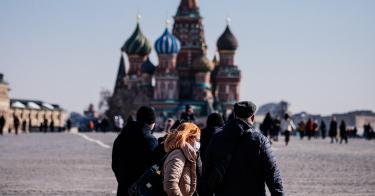Russia, like the rest of the world, is dealing with the novel coronavirus. Stores are experiencing shortages, temporary hospitals are being built at a rapid pace, and the number of virus cases continues to rise. However, the main issue surrounding the COVID-19 virus in Russia now doesn’t pertain to physical needs, but rather the Kremlin’s handling of the virus and the propaganda it is disseminating.
On March 19, authorities of all federal regions of Russia declared high alert. This means that large gatherings are now banned, schooling has transitioned to online classes, and at-home work is encouraged for the foreseeable future.
As of March 24, Russia has reported 495 cases of coronavirus, with one death that occurred in Moscow. The woman who died had a preexisting condition and was 79 years old.
It is strange that only one death has been reported so far. Russia is a nation of more than 141 million people. It shares a 2,600-mile border with China, the source of the virus. China is comprised of nearly 1.4 billion people and has reported 3,277 deaths as of March 24. Russia also shares a border with North Korea, which is made up of about 25 million people and likely has as many coronavirus deaths as South Korea (120 as of March 24).
If those countries are reporting that many deaths from the coronavirus, surely Russia has experienced more than one.
Likewise, 495 cases of the coronavirus in Russia is a very low number, considering how much the virus has progressed thus far. China, for example, has reported more than 81,000 cases.
Interestingly, though, the number of pneumonia cases has sharply risen in Russia. The COVID-19 virus, a respiratory disease, can progress to pneumonia, a potentially life-threatening inflammation of the lungs.
A lack of testing might partly explain why so few coronavirus cases are being reported. Russia began testing en masse in early February, but it didn’t start testing those arriving from Italy or other European Union nations right away. This likely played a role in coronavirus spreading throughout Russia.
Russian President Vladimir Putin says the coronavirus situation in Russia is “under control,” but this seems to be false reassurance.
It is probable that Putin won’t explain the whole picture because he cherishes the thought of being in control, as well as preserving his reputation.
This is what occurred during Soviet times; the Soviet state would lie and report propaganda in order to bolster and preserve its reputation.
As a comparison, albeit imperfect, consider what happened amid the Chernobyl crisis in 1986. Chernobyl remains the world’s worst-ever civil nuclear disaster. However, at the time, Soviet authorities were in denial about it, lied about the amount of danger posed, or would not own up their mistakes that contributed, leading up to the explosion.
Some Russians are even making that comparison, saying, “Oh, it’s Chernobyl again.” They assume or believe the government is lying about this new pandemic, and that the Russian state could be underestimating the situation, just as it did in 1986.
The coronavirus is indisputably a much different crisis than Chernobyl, but the Kremlin’s reaction to and handling of the situation does not differ much, if at all.
The corruption within the Kremlin runs rampant, and not only there. It also trickles down to Russia’s rich elite. Rich families are setting up medical clinics within their homes in case they come down with the virus. They want to “ensure” their medical care surpasses what they would receive in a hospital. Worse, they are buying up and hoarding ventilators. Doctors in Russia’s rural regions are worried they won’t have enough ventilators when the virus peaks.
The situation surrounding the coronavirus in Russia right now is worrisome, from practically every angle. But the point is that much hasn’t changed since Soviet times. The Russian government is likely lying to its people, but its citizens deserve better than that. The Kremlin should put their well-being and trust above its own reputation.
This piece originally appeared in The Washington Examiner



